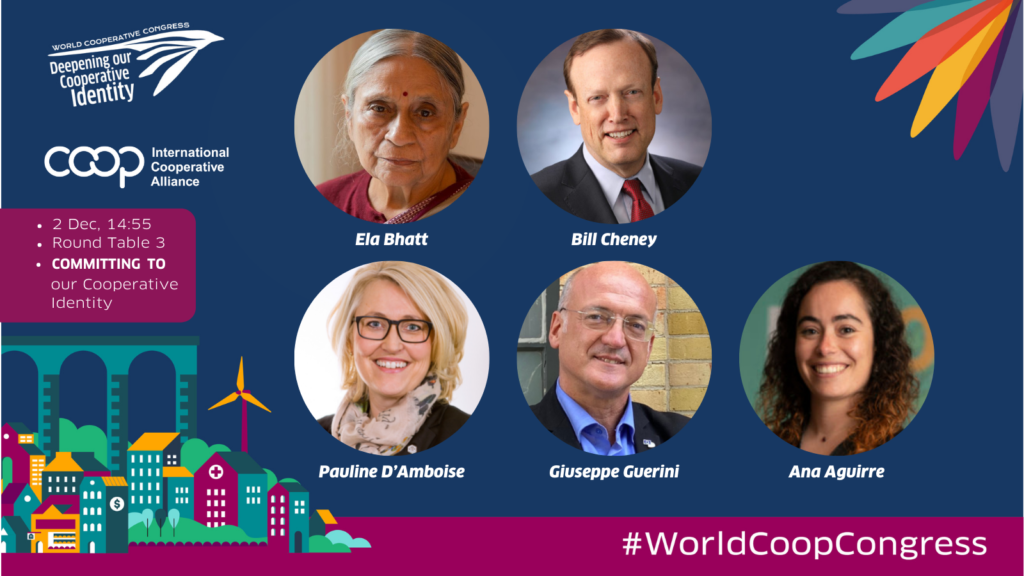
Read more from the Keynote speech by Ela Bhatt here.
The third plenary of the World Cooperative Congress included a round table on committing to our cooperative identity for a positive global change
Asked to identify the challenges cooperatives must tackle, Giuseppe Guerini, Vice Chair of the ICA G20 WG, and President of CECOP-CICOPA EUROPE, said: “We can fight against exclusion, and we can also try to reduce poverty. We now have the opportunity to show that we can play an economic role for the most underprivileged. It is the question of sustainability, of climate change, it’s about transforming the economy.”
Digital tech, demographic changes and migration mean we have to think about the future of labour, he said, and cooperatives working in these areas can curb poverty.
Cooperatives are a broad community for the common good, he said, using tech to bring in a new type of mutuality and sharing. Online behaviour shows a desire for relationships and a network and cooperatives have the values to deliver that.
“We must not be afraid of innovation, and technology. Digital technologies, for instance, can help us to increase the capacities of the cooperative.”
Cooperatives must share their wealth of data – “the energy of the future” – to deliver change, he said.
Ana Aguirre, co-founder and worker-owner, Tazebaez Co-op, an international educational worker cooperative spun off from Mondragon University, and Vice Chair for Europe ICA Youth, Spain, said cooperatives could answer young people’s fears over the future of work.
This fear is not just in terms of pay but stems from a desire for jobs “that make us better humans, and are really connected with the values that we stand for”, she said.
Young people want employment that delivers emancipation and autonomy, and are “ready to take stands“, she said.
Cooperatives must respond to this by rethinking the idea of representation, she said. “Half the world is youth, but half this room is not youth; half the world is women, but half this room is not women”.
She challenged the movement to “walk the talk” and give space to young people to be entrepreneurs and create new cooperatives.
Bill Cheney, board member of the WOCCU Worldwide Foundation Board and President of Schools First Federal Credit Union in California, USA, said cooperatives can address “economic inequality, social inequality, digital inequality” – which often stem from systemic barriers to financial services and quality education.
Credit unions play a role in this, he said. “People should also have the choice of a not-for-profit institution where they can be part of the solution … Banks use people to make money. Credit unions use money to help people.”
Credit unions help overcome systemic, racist barriers to financial services by not using the credit scoring systems that exclude certain groups in society, he said.
Mr Cheney added that principle 6 – cooperation among cooperatives – sees credit unions doing something corporate banks don’t: collaborating to deliver solutions to social problems, giving the example of Californian credit unions working together to deliver financial education to young people.
Pauline D’Amboise, Secretary General and Vice-President of Governance and Sustainable Development at Desjardins Group, Canada, said the climate crisis and the pandemic had exacerbated the needs of vulnerable populations.
“We talk about energy transition,” she said, “but we should talk about energy and social transition because this transition will have to be fair. It will have to take into account the impact on workers and their communities.”
Diverse risks range from cybersecurity to “polarisation or maybe cynicism and the lack of trust towards institutions”.
She said there are global frameworks, like the UN SDGS, where cooperatives can “join forces to find solutions to different challenges that do serve for the common good”.
Ms D’Amboise gave the example of Desjardins’ Circular Economy Research Center “where digital entrepreneurs and researchers will work together to find solutions by sector, to promote circularity, in business models”.
Panelists were asked to link these ideas to the cooperative identity.
Mr Guerini said the identity can deliver meaning and connection as technology continues to change people’s lives. “We must maintain connection with an idea,” he said.
Cooperative networks can respond to crises: for instance, cooperatives in Italy have been offering care, training, employment, inclusion and entrepreneurship opportunities for migrants – making up for the “failure” of the European Union to deal with migration.
Mr Cheney said: “Every person who joins our institution spends a minimum of a week understanding who we are as an institution, that we’re not just another bank that we’re different.”
This includes a commitment to inclusion in terms of youth; of breaking down inequalities affecting existing members; and driving inclusive governance from the ground up.
Ms Aguirre said cooperatives are working on the right lines because they are “rooted in global communities … international, multigenerational and culturally diverse”.
“The best years of cooperatives are yet to come,” she said.
Ms D’Aboise said all Desjardins workers are given training in cooperative values, emphasising the point that “we must always work in the interest of our clients and members to support them in their financial autonomy”.
And she reiterated Desjardins’ commitment to diversity, inclusion and its work towards gender parity. Practical steps to reduce inequality include microfinance programs for individuals and entrepreneurs, she said.
